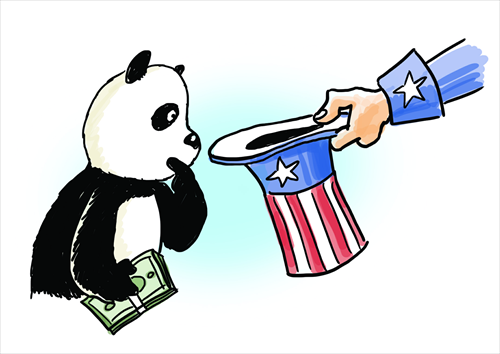HOME >> OP-ED
China reconsiders long bet on Treasuries
By Stephen S. Roach Source:Global Times Published: 2013-10-28 19:28:01

Illustration: Liu Rui/GT
In 2008, China surpassed Japan as the largest foreign lender to the US. Over the ensuing five years and a half through July 2013, China has purchased $853 billion more in US Treasuries than Japan. China's share of publicly held government debt in the US soared from 1.8 percent in 2000 to 10.7 percent by mid-2013.
China's bet on US Treasuries is a key aspect of the codependency that binds the world's two largest economies together. It works for China because it anchors the stability of the yuan and limits its appreciation against the dollar.
While the yuan has risen some 35 percent versus the greenback since July 2005, the appreciation would have undoubtedly been greater in light of China's large current account surpluses and rapidly expanding foreign exchange reserves.
Recycling those reserves, which now total nearly $3.7 trillion, into dollar-denominated assets has enabled China to manage yuan appreciation with an eye toward maintaining its competitiveness and sustaining its export-led growth strategy.
China's bet on US Treasuries has also worked quite well for the US. It has provided an increasingly important source of external funding that a saving-short US economy has so desperately needed.
By doing so, Chinese demand for US Treasuries has also limited upward pressures on longer-term US interest rates, possibly by an entire percentage point.
That, in turn, has provided valuation support for other asset markets that buttressed US domestic demand, especially private consumption. And China's support for US aggregate demand has provided impetus to the external underpinnings of its export machine.
The mutual benefits of codependency are no longer sustainable. Of the two nations, China has been first to figure this out. The rebalancing of an unbalanced Chinese economy is a central feature of the 12th Five-year Plan (2011-15).
With that rebalancing, a consumer-led China will draw down its surplus saving and reduce its accumulation of foreign exchange reserves. And that will have the important effect of curtailing China's demand for dollar-denominated assets, especially US Treasuries.
That will put further upward pressure on the yuan, but that outcome is actually quite consistent with an internal demand impetus to Chinese economic growth that would benefit from a stronger currency.
The debt crisis in Washington underscores the urgency of this shift in China's growth strategy. Why should China stay on a path that leads a further sharp accumulation of tainted assets?
In the end, it boils down to an objective exercise in risk-adjusted portfolio management.
Washington's debt crisis changes the risk calculus. While there is still a strong case to be made that the US will not default on its sovereign debt, that case is weaker today than it was a year ago, let alone five years ago. That means there is now a new element of the risk in the once riskless asset.
In that context, China's official asset managers, the State Administration of Foreign Exchange (SAFE), need to take their acronym seriously and draw up a contingency plan for reducing their massive overweight in dollar-denominated securities.
Of course, SAFE cannot simply push a button and shift the reserve portfolio from dollars to other currencies and hard assets. Any such actions would have important consequences for the real economy.
It is critically important for the new Chinese leadership team to realize that it no longer has time on its side in contemplating the dual shifts in its economic structure and its portfolio of foreign exchange reserves. Self-healing of the ideological polarization of a dysfunctional US government is highly unlikely.
But the Washington budget and debt fiasco could well be the tipping point for China's realization of the perils of staying with an old growth model for too long.
The upcoming Third Plenary Session of the 18th CPC Central Committee provides China's new leaders with an important opportunity to deliver on the specifics of a comprehensive reform and rebalancing strategy. The message from a dysfunctional Washington is that Beijing cannot afford to squander this opportunity.
The author is a faculty member at Yale University and former chairman of Morgan Stanley Asia. opinion@globaltimes.com.cn
Posted in: Viewpoint